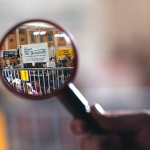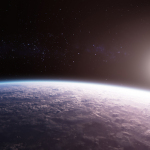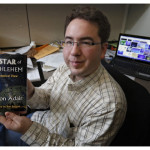Will We Have Free Will in Heaven?
by Jimmy Akin
Filed under The Problem of Evil
Will we have free will in heaven?
If so, does that mean we might sin and fall again?
If not, what kind of free will would we have there?
And if God can harmonize our free will and sinlessness in heaven, why doesn't he do so in this life?
Here are some thoughts . . .
A Robot "Loves" Me. Big Deal.
NOTE: This is part of a series on the problem of evil. Click here to read the previous posts in the series.
In a previous post, we looked at a common answer to the problem of evil--that God allows sin and the suffering it causes to exist because the only way to eliminate them would be to eliminate free will.
Without free will, according to this view, something important would be lost.
If we didn't freely choose good--to freely love God and love our fellow human beings--then these actions would lose something very important.
It would be like being "loved" by a robot--a being programmed to do nothing else.
The Love of the Saints
What about the saints in heaven? They don't sin. Does that make their love less valuable?
It would go against the grain of the Christian worldview to say that the saints in heaven love God in an inferior way compared to the way we are able to love him in this life.
Sainthood--understood as being with God for all eternity--is the goal of the Christian life, the fulfillment of the Christian life, not something inferior to it.
So what's the answer?
The Timelessness Solution
One solution might be based on the popular idea that when we die, we leave time and enter the timeless realm of eternity.
On this view, the final moment of our earthly life is the final moment of our existence in time.
Whatever our choice regarding God is in this final moment, it carries over into eternity.
Our wills regarding the choice to love God, therefore, would not change, because we would be in eternity and not have the capacity to change.
How successful is this answer?
And Yet . . . It Moves
The problem with the answer is that we do continue to move (change) after our deaths.
While God may be completely outside of time, we aren't, even in the afterlife. This is something that you can explore here.
We certainly continue to experience change in the afterlife:
- We can be purified of the consequences of our sins in purgatory.
- We can enter the full glory of heaven upon leaving purgatory.
- We will be reunited with our bodies at the General Resurrection.
We can definitely experience change after our deaths.
Even if this change takes place through something other than time as we experience it in this life, it still happens.
And if we can experience changes in the state of our souls like those described above, why can't our wills change?
It would seem that there are two possibilities:
- The nature of our will is altered so that it can't change, or
- We enter a condition where the fundamental orientation of the will does not change.
What do these options mean?
Option #1
God might change the nature of the will so that a person can only choose good. He removes its ability to choose evil.
This does not mean removing all free will.
One might, for example, be able to choose among different good options, but not any evil ones.
This would be free will; it would simply be a different kind of free will than we experience in this life--a freedom to choose only among different goods.
Option #2
On the other hand, God might not change the will's fundamental capacity to choose either good or evil. Instead, he might place us in a condition where--although we could still theoretically choose both--we in fact never end up choosing evil.
Why might this happen?
A common suggestion is that when we have the Beatific Vision--when we have full awareness of God's goodness--the vision of good will be so compelling that we never choose evil.
Impeccability
In either case, the blessed in heaven would be impeccable--that is, not able to sin--either because of a change in the nature of the will or a change in the circumstances in which the will operates (or both).
Precisely how this works is an open question. The Catholic Encyclopedia notes:
Whilst the impeccability of the blessed appears to be unanimously held by theologians, there is a diversity of opinion as to its cause [s.v. "Heaven"].
The Problem
Whatever the reason for the saints' impeccability, it raises a question for the problem of evil: If God can make our final state one of impeccability, why didn't he make our initial state one of impeccability?
It would seem that doing so would be within the realm of God's omnipotence. That is, he has the ability to create beings that are confirmed in the state of good from the first moment of their existence.
There doesn't seem to be a logical contradiction in the idea of God simply creating new saints in heaven who never lived on earth, and anything that doesn't involve a contradiction is something God can do.
So why doesn't he?
The "No Obligation" Answer
One answer would be that, even though God could create beings already confirmed in good, he is under no obligation to do so.
Creating beings with free will of the type we experience in this life--the type that can be misused--is a legitimate move.
If some of those beings end up misusing their free will, that's not God's fault--precisely because their wills are free. They are the ones that choose evil, not God.
While this answer is possible, it will strike many as unsatisfying.
One reason is that it cuts against the free will defense we have considered previously--that God finds something valuable in the exercise of free will of the type we have in this life.
Is there a way to reconcile the value he sets on it in this life with the fact that we will not be able to choose evil in heaven?
I think there is . . .
Choosing to Commit
Of the two types of rational created beings we know about--angels and humans--God has given both a chance to choose for or against him.
The angels had this experience in the past and then either became good or evil, depending on their choice.
Humans have the chance to choose over the course of our earthly lives, at the end of which our wills become fixed on either good or evil.
In both cases, God gives to his creatures a choice to commit one way or the other.
It is not an endless series of choices, where our wills can fluctuate back and forth forever. Sooner or later, we must commit.
It's not the ability to switch back and forth between good and evil forever that God values. It's the free choice of an ultimate commitment.
God wants us to freely choose to commit to him--or not.
Is it reasonable to value this type of commitment?
I think it is. We place a similar value on freely made commitments in this life.
A Marriage Analogy
While there are many situations in this life in which we freely make commitments to each other, a particularly striking one is the case of a marriage.
We would not value the love of a robot. Stepford wives are just creepy.
And we would not want to impose marriage on someone against their will. That would involve the abomination of rape, among other things.
We want our mates to freely choose us. This is true even in societies that have arranged marriages. There must be a fundamental, free consent on the part of both spouses or the marriage will not be valid. (Not from the Catholic Church's point of view, anyway.)
But marriage isn't a momentary choice that involves no commitment. It's a life-long commitment.
What we value, then, is a free choice that leads to a permanent commitment.
And that is what we have here.
The Divine Marriage
The Bible is full of marriage imagery applied to God and man. It occurs in the Old Testament, between God and his people Israel. And it occurs in the New Testament, between Jesus and his Church.
Through the centuries, Christians have elaborated this theme further.
It is thus possible to see this life as the time of courtship between God and the individual soul--when a free choice for or against God must be made--and heaven as the marriage--the time of freely chosen commitment--which follows.
Unless God is jilted at the altar.
What Now?
If you like the information I've presented here, you should join my Secret Information Club.
If you're not familiar with it, the Secret Information Club is a free service that I operate by email.
I send out information on a variety of fascinating topics connected with the Catholic faith.
In fact, the very first thing you’ll get if you sign up is information about what Pope Benedict said about the book of Revelation.
He had a lot of interesting things to say!
If you’d like to find out what they are, just sign up at www.SecretInfoClub.com or use this handy sign-up form:
Just email me at jimmy@secretinfoclub.com if you have any difficulty.
In the meantime, what do you think?
Related Posts
Note: Our goal is to cultivate serious and respectful dialogue. While it's OK to disagree—even encouraged!—any snarky, offensive, or off-topic comments will be deleted. Before commenting please read the Commenting Rules and Tips. If you're having trouble commenting, read the Commenting Instructions.













